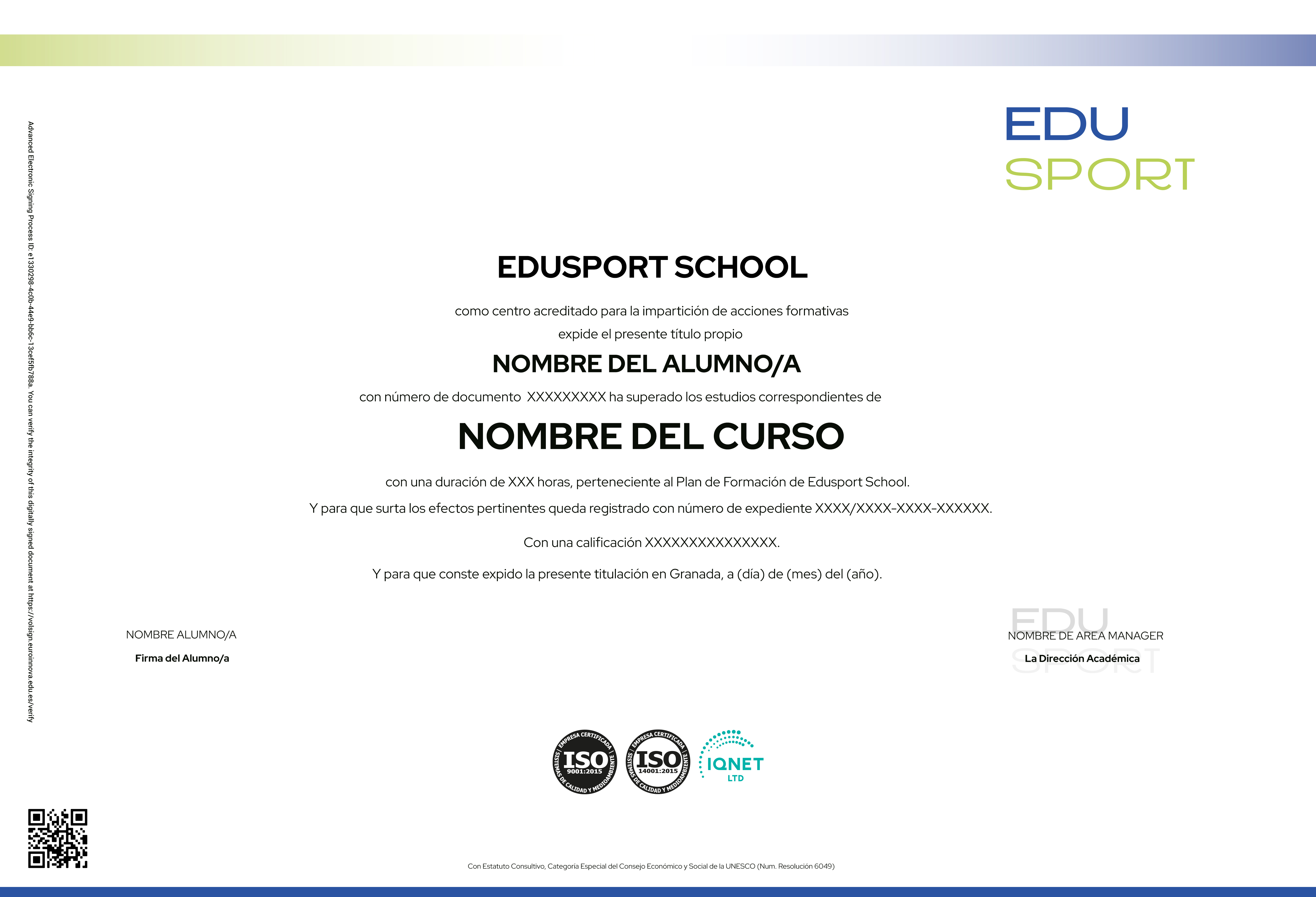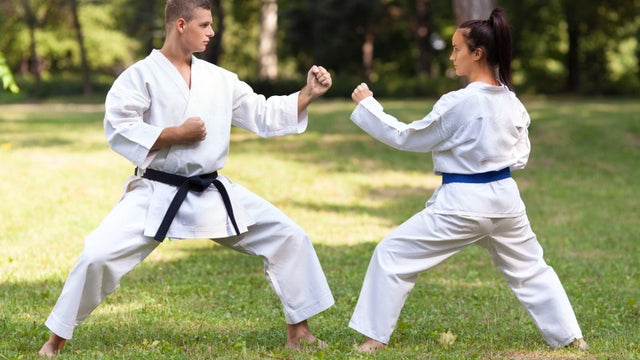Karate Monitor Course + Nutrition Specialization of Sports Practice (Double Degree + 8 ECTS Credits)

Request information


Syllabus
Download syllabus in PDFCurriculum
Summary
The interest in martial arts has been growing since its entry into the West, filling the gyms of practitioners of this martial art, karate. With this Karate monitor course + Nutrition Specialization of sports practice, all the foundations related to these martial arts and this philosophy will be studied, as well as physical and mental preparation, and the structuring and preparation of karate classes. Today, the concern for everything that refers to dietary and human nutrition is already very high and is justified by a series of factors, among which we highlight a greater demand for quality of life in contemporary western society that translates into the search for a better diet, healthier and more balanced. The appropriate diet to enjoy good health is the result of the application of basic knowledge that demonstrates the links between the intake of certain foods with some pathologies, such as cardiovascular diseases, arteriosclerosis, obesity, diabetes, etc. With the Karate monitor course + Nutrition Specialization of sports practice, it is intended to offer an approach to dietary and nutrition in the sports field to know the nutritional needs of the athletes to develop balanced diets and consistent with their energy expenditure.
Goals
Professional opportunities
To prepare you
The interest in martial arts has been growing since its entry into the West, filling the gyms of practitioners of this martial art, karate. With this Karate monitor course + Nutrition Specialization of sports practice, all the foundations related to these martial arts and this philosophy will be studied, as well as physical and mental preparation, and the structuring and preparation of karate classes. Today, the concern for everything that refers to dietary and human nutrition is already very high and is justified by a series of factors, among which we highlight a greater demand for quality of life in contemporary western society that translates into the search for a better diet, healthier and more balanced. The appropriate diet to enjoy good health is the result of the application of basic knowledge that demonstrates the links between the intake of certain foods with some pathologies, such as cardiovascular diseases, arteriosclerosis, obesity, diabetes, etc. With the Karate monitor course + Nutrition Specialization of sports practice, it is intended to offer an approach to dietary and nutrition in the sports field to know the nutritional needs of the athletes to develop balanced diets and consistent with their energy expenditure.
Who is it addressed to?
The interest in martial arts has been growing since its entry into the West, filling the gyms of practitioners of this martial art, karate. With this Karate monitor course + Nutrition Specialization of sports practice, all the foundations related to these martial arts and this philosophy will be studied, as well as physical and mental preparation, and the structuring and preparation of karate classes. Today, the concern for everything that refers to dietary and human nutrition is already very high and is justified by a series of factors, among which we highlight a greater demand for quality of life in contemporary western society that translates into the search for a better diet, healthier and more balanced. The appropriate diet to enjoy good health is the result of the application of basic knowledge that demonstrates the links between the intake of certain foods with some pathologies, such as cardiovascular diseases, arteriosclerosis, obesity, diabetes, etc. With the Karate monitor course + Nutrition Specialization of sports practice, it is intended to offer an approach to dietary and nutrition in the sports field to know the nutritional needs of the athletes to develop balanced diets and consistent with their energy expenditure.
Official Character
This training is not included in the scope of official regulated training (Infant Education, Primary Education, Secondary Education, Official Professional Training FP, Baccalaureate, University Degree, Official University Master and PhD). It is therefore a complementary and/or specialization training, aimed at acquiring certain skills, skills or aptitudes of a professional nature, being able to be barely as merit in workbags and/or opposition competitions, always within the complementary training section and/or continuous training being always essential to review the specific requirements of the public labor stock of the public labor stock market.

Our methodology combines technology, pedagogy and empathy for learning tailored to you.
You set the pace, decide the path and artificial intelligence accompanies you so that you learn better, with meaning and purpose.

Truly personalized learning
Your style, interests and level define the route. You are the starting point.

Constructivism in action
Explore, experiment and apply. Learning means understanding, not memorizing.

AI that accompanies you, not directs you
PHIA, our artificial intelligence assistant guides you without limiting your autonomy.

Evaluation without pressure
Continuous and adaptive feedback. Because learning is a process, not a number.
Certification

Double degree: - Karate monitor degree with 200 hours issued by Edusport, center specialized in sports training. - Permanent training course in nutrition of sports practice issued by the Miguel de Cervantes European University accredited with 8 University ECTS

EducaHub Scholarships
Make your training more accessible: finance at 0% interest and obtain personalized scholarships.
At EducaHub we believe that education should be available to everyone. For this reason, we offer a Scholarship Plan that facilitates your access to practical, current and quality training, eliminating economic barriers.
-25%
Alumni Scholarship: for former EducaHub students.
-20%
Unemployment Scholarship: if you prove that you are unemployed.
-20%
Large Family Scholarship: for families with 3 or more children.
-20%
Disability Scholarship: for people with disabilities ≥33%.
-15%
Emprende Scholarship: for self-employed workers who can prove their activity.
-15%
Recommended Scholarship: if you come recommended by a former student.
-15%
Group Scholarship: for joint registrations of 3 or more people.

An entire educational universe, on a single platform.
An intuitive environment with AI that guides you to train autonomously and with purpose.

Learn at your pace
Courses, master's degrees and official qualifications. 100% online, flexible and at your pace.

Access from anywhere
Available 24/7 on mobile, tablet or PC. You decide when and how to train.

Phia, your AI mentor
It challenges you, motivates you and personalizes your path. Learn with a guide that evolves with you.

LX One Plus: Training without limits
Unlock soft skills, languages and more. Move towards comprehensive and continuous training.



